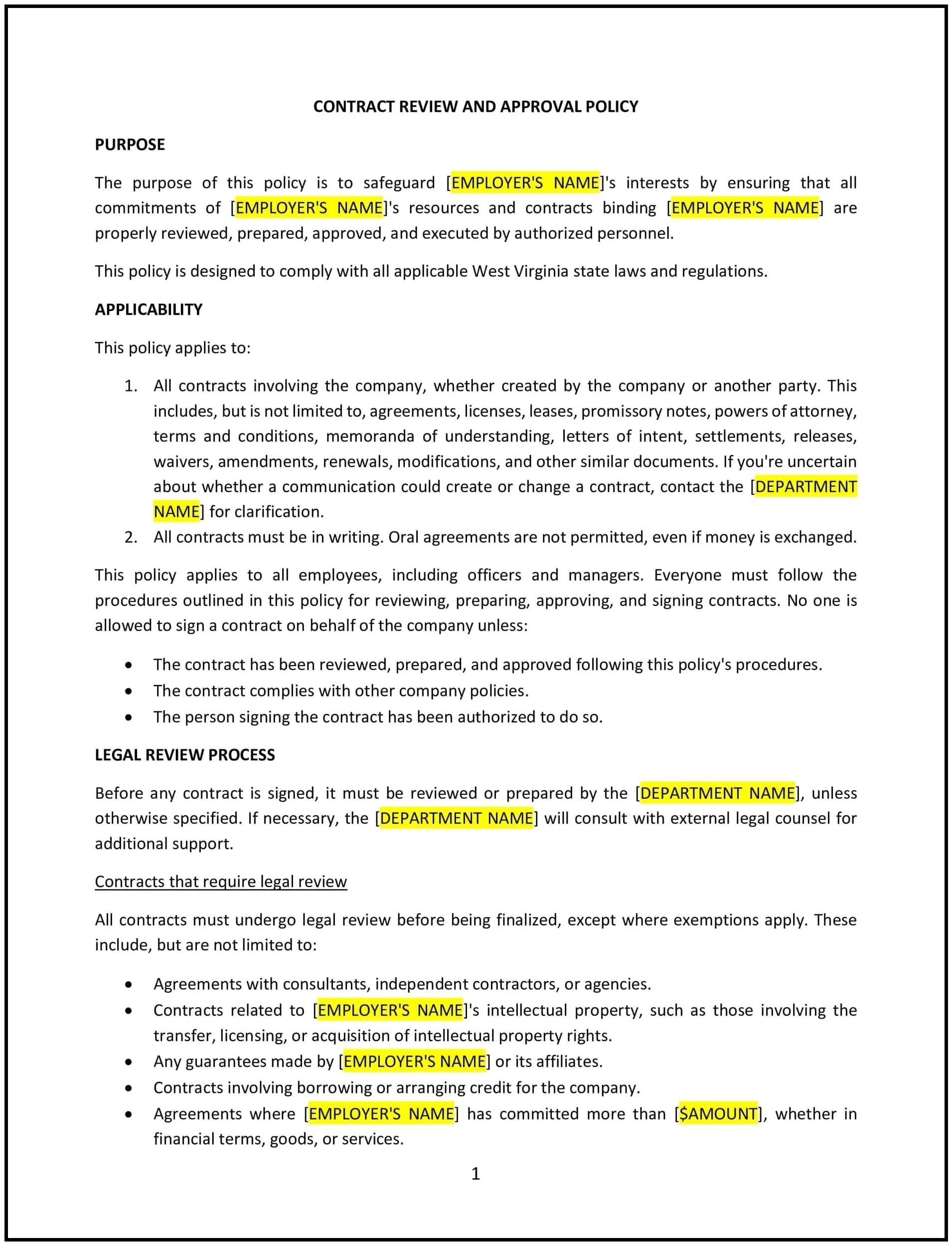Contract review and approval policy (West Virginia): Free template
Got contracts to review? While you're here for policies, let Cobrief make contract review effortless—start your free review now.

Customize this template for free
A contract review and approval policy helps West Virginia businesses establish a formal process for reviewing, approving, and executing contracts to support legal compliance, align with company objectives, and minimize risks. This policy outlines the steps for reviewing contracts, the roles involved in the approval process, and the documentation required to ensure that all contracts are properly vetted before being signed.
By implementing this policy, businesses can protect themselves from legal liabilities, ensure that contracts are consistent with company standards, and streamline the approval process for efficiency and accountability.
How to use this contract review and approval policy (West Virginia)
- Define the scope of contracts: Specify the types of contracts covered under the policy, including commercial agreements, vendor contracts, employee agreements, lease agreements, and any other legally binding documents the company may enter into.
- Set up a review process: Outline the steps involved in reviewing contracts, including legal review, financial review, and business-specific review to ensure that all relevant departments are involved in the process.
- Assign roles and responsibilities: Designate individuals or departments responsible for reviewing contracts, such as the legal team, finance department, or senior management, and specify their areas of focus (e.g., legal compliance, financial impact, business goals).
- Specify approval authority: Define who has the authority to approve contracts at different levels, depending on the value or complexity of the contract. For example, low-value contracts may be approved by department heads, while high-value or high-risk contracts may require board approval.
- Establish contract templates and guidelines: Provide standardized contract templates and guidelines for common contract types to ensure consistency and reduce the time spent on contract negotiation and review.
- Address negotiation and amendments: Specify how contract negotiations should be handled and the process for making amendments or modifications to existing contracts.
- Set timelines: Establish timelines for the contract review and approval process, ensuring that contracts are reviewed in a timely manner without unnecessary delays.
- Document the process: Keep records of all reviewed contracts, approvals, and any changes made during the negotiation process to maintain transparency and accountability.
Benefits of using this contract review and approval policy (West Virginia)
This policy offers several benefits for West Virginia businesses:
- Reduces legal risks: A thorough review and approval process helps identify and address potential legal issues or risks before the contract is signed, reducing the likelihood of disputes or legal liabilities.
- Promotes compliance: By involving legal and financial experts in the review process, businesses can ensure that contracts comply with relevant laws and regulations, minimizing the risk of non-compliance.
- Improves efficiency: A clear and structured review process streamlines the contract approval workflow, reducing delays and ensuring that contracts are approved in a timely manner.
- Protects business interests: Involving relevant departments in the review process ensures that contracts align with the company’s objectives, protect its interests, and minimize risks.
- Enhances accountability: By documenting each step of the contract review and approval process, the policy ensures that there is a clear record of who approved the contract and why, increasing transparency and accountability.
Tips for using this contract review and approval policy (West Virginia)
- Communicate the policy clearly: Ensure that all employees involved in contract negotiation, review, and approval understand the steps and their roles in the process.
- Provide training: Offer training to employees on how to review and negotiate contracts, as well as on the company’s contract templates and guidelines.
- Monitor the process: Regularly assess the efficiency and effectiveness of the contract review process, looking for areas of improvement to ensure that contracts are reviewed and approved in a timely and accurate manner.
- Use standardized templates: Encourage the use of contract templates for common agreements to ensure consistency and reduce the time spent on contract creation and negotiation.
- Review and update regularly: Periodically review the policy to ensure that it reflects current legal requirements, business needs, and best practices.